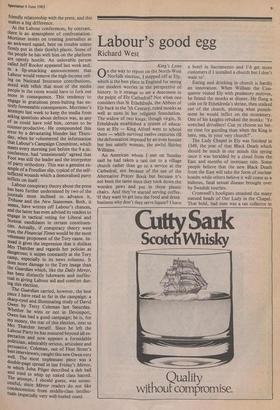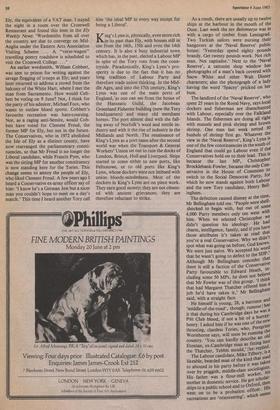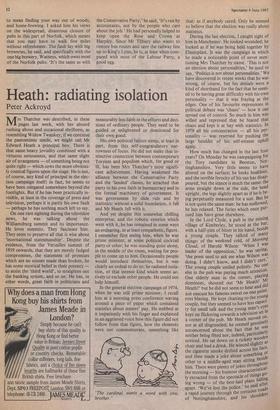Labour's good egg
Richard West
King's Lynn On the way to report on the North-West Norfolk election, I stopped off at Ely, which is the best place in England for seeing our modern worries in the perspective of history. Is it strange to see a deaconess in the pulpit of Ely Cathedral? Not when one considers that St Etheldreda, the Abbess of Ely back in the 7th Century, ruled monks as well as nuns in her religious foundation. The widow of two kings, though virgin, St Etheldreda established a system of educa- tion at Ely — King Alfred went to school there — which survived twelve centuries till the deformation imposed by an even bossier but less saintly woman, the awful Shirley Williams.
An American whom I met on Sunday said he had taken a taxi out to a village church rather than go to a service at the Cathedral, not because of the use of the Alternative Prayer Book but becuase it's not been the same since they took down the wooden pews and put in those plastic chairs. And they've started serving coffee. `If they want to get into the food and drink business why don't they serve liquor? I have
a hotel in Sacramento and I'd get more customers if I installed a church but I don't want to'.
Eating and drinking in church is hardly an innovation. When William the Con- queror visited Ely with predatory motives, he found the monks at dinner. He flung a coin on St Etheldreda's shrine, then stalked out of the church, plotting what punish- ment he would inflict on the monastery. One of his knights rebuked the monks: 'Ye wretched drivellers! Can ye choose no bet- ter time for guzzling than when the King is here, yea, in your very church?'.
The Lady Chapel in Ely was finished in 1349, the year of that Black Death which should be much in our minds this spring since it was heralded by a cloud from the East and months of incessant rain. Some people believe that the new Black Death from the East will take the form of nuclear bombs while others believe it will come as a hideous, fatal sexual disease brought over by Swedish tourists.
Cromwell's hooligans smashed the many statued heads of Our Lady in the Chapel. That bold, bad man was a tax collector in
Ely, the equivalent of a VAT man. I stayed the night in a room over the Cromwell Restaurant and found this item in the Ely Weekly News: 'Wordsmiths from all over the country are due to converge on Mid- Anglia under the Eastern Arts Association Visiting Scheme ... A "verse-wagon" travelling poetry roadshow is scheduled to visit the Cromwell College. ... '
An earlier wordsmith, William Cobbett, was sent to prison for writing against the savage flogging of troops at Ely; and years later returned to address a crowd from the balcony of the White Hart, where I met the man from Sacramento. How would Cob- bett be voting on 9 June? Not, I think for the party of his admirer, Michael Foot, who wants to outlaw blood sports. Cobbett's favourite recreation was hare-coursing. Nor, as a raging anti-Semite, would Cob- bett have voted for Clement Freud, the former MP for Ely, but not in the future. The Conservatives, who in 1972 abolished the Isle of Ely as a distinct county, have now rearranged the parliamentary consti- tuencies, so that Mr Freud is no longer the Liberal candidate, while Francis Pym, who was the sitting MP for another constituency is now standing here for the Tories. This change seems to annoy the people of Ely, who liked Clement Freud. A few years ago I heard a Conservative ex-army officer say of him: '1 know he's a German Jew but a nicer man you couldn't hope to meet on a day's march.' This time I heard another Tory call him 'the ideal MP in every way except for being a Liberal'.
King's Lynn is, physically, even more rich in its past than Ely, with houses still in use from the 16th, 15th and even the 14th century. It is also a busy industrial town which has, in the past, elected a Labour MP in spite of the Tory vote from the coun- tryside. Paradoxically, King's Lynn's pro- sperity is due to the fact that it has no long tradition of Labour Party and therefore trade union thinking. In the Mid- dle Ages, and into the 17th century, King's Lynn was one of the main ports of England, as one can see from the house of the Hanseatic Guild, the Jacobean Greenland Fisheries building (now the Tory headquarters) and many old merchant homes. The port almost died with the fall- ing away of Norfolk's wool and textile in- dustry and with it the rise of industry in the Midlands and North. The renaissance of King's Lynn as a port came after the second world war when the Transport & General Workers' Union set out to ruin the docks of London, Bristol, Hull and Liverpool. Ships started to come either to new ports, like Felixstowe, or to old ports like King's Lynn, whose dockers were not imbued with union bloody-mindedness. Most of the dockers in King's Lynn are on piece work. They earn good money; they are not obsess- ed with ancient grievances; they are therefore reluctant to strike. As a result, there are usually up to twelve ships at the harbour in the mouth of the Ouse. Last week the my Belomorye was in with a cargo of timber from Leningrad. Two Turkish sailors were nursing their hangovers at the 'Naval Reserve' public house: 'Yesterday spend eighty pounds brandy. Get twenty pounds work. Not rich man. Not capitalist.' Next to the 'Naval Reserve', a tattooist shop window has photographs of a man's back covered with Snow White and other Walt Disney characters; also the photograph of a lady having the word `Spacey' pricked on her bum.
The landlord of the 'Naval Reserve', who spent 25 years in the Royal Navy, says local dockers and fisherman are disenchanted with Labour, especially over the Falkland Islands. The fishermen are doing all right with mussels and pink shrimp and brown shrimp. One man last week netted 30 bushels of shrimp first go. Whatever the view in the 'Naval Reserve', King's Lynn is
one of the few constituencies in the south of England that could go Labour even if the Conservatives hold on to their lead. This is because the last MP, Christopher Brocklebank-Fowler, became the only Con- servative in the House of Commons to switch to the Social Democrat Party, for which he now stands against both Labour and the new Tory candidate, Henry Bell- ingham. The defection caused dismay at the time, Mr Bellingham told me. 'People were shell- shocked to begin with, but out of some 4,000 Party members only ten went with him. When we selected Christopher we didn't question his ideology. He had charm, intelligence, family, and if you have those attributes it's taken as read that you're a real Conservative. Why we didn't spot what was going on before, God knows. We were just naive. We accepted his word that he wasn't going to defect to the SDP•, Although Mr Bellingham concedes that there is still a faction of the Conservative Party favourable to Edward Heath, In- cluding some 50 MPs, he does not believe
'' has `middle-of-the-road , though rumour] it Mr Fowler was of this group. 'I think that had Margaret Thatcher offered him a job he'd have taken it,' Mr Bellingham said, with a straight face.
He himself is young, 28, a barrister, and it that during his Cambridge days he was a Pitt Club blood, if not a bit of a hurray- henry. I asked him if he was one of the new thrusting, classless Tories, who, Peregrine Worsthorne says, will soon be running the country. 'You can hardly describe an old Etonian, ex-Cambridge man as fitting to t° the Thatcher, Tebbiti mould,' I he I replie.d. The Labour candidate, Mike Tilbury, Is a. likeable, bearded man of the kind that used to abound in his party before it was taken over by priggish, middle-class sociologists. His father was a flour-mill worker, his mother in domestic service. He got scholar went ontoona ptoubbliec school andbaantdiotno Oxford, His recreations are 'orienteering', which seems
to mean finding your way out of woods, and home-brewing. I asked him his views on the widespread, disastrous closure of pubs in this part of Norfolk, which means that you may have to walk five miles without refreshment. The fault lay with big breweries, he said, and specifically with the one big brewery, Watneys, which owns most of the Norfolk pubs. 'It's the same as with the Conservative Party,' he said, 'It's run by accountants, not by the people who care about the job.' He had personally helped to keep open the Rose and Crown at Harpley. Since Mr Tilbury also wants to restore bus routes and save the railway line up to King's Lynn, he is, at least when com- pared with most of the Labour Party, a good egg.
















































 Previous page
Previous page